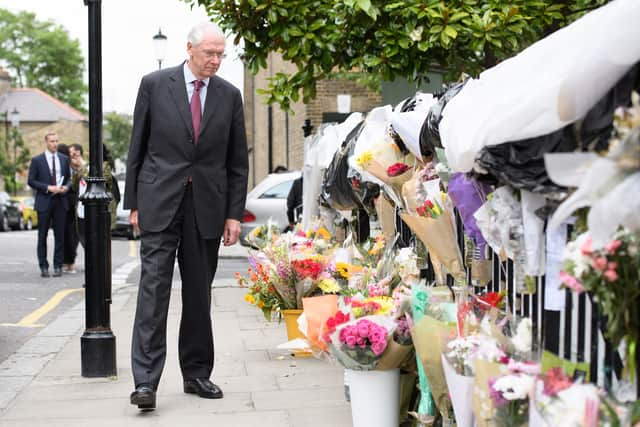Is the Grenfell Tower Inquiry still ongoing? When will it deliver a verdict into 2017 fire and who led review
and live on Freeview channel 276
Five years after the Grenfell Tower disaster relatives and the community are still waiting for justice.
The fire at Grenfell Tower took place in North Kensington, London in June 2017, claiming the lives of 72 people.
Advertisement
Hide AdAdvertisement
Hide AdThe tower block, which was made up of 129 flats has been left as it stands, with still no plans on what to do with the structure.
In response to the disaster, the Grenfell Tower Inquiry was established in 2018 to uncover what failings led to the tradegy.
So far, the Inquiry has reviewed more than 30,000 documents and uncovered shocking failings from services across the community.
Here’s everything you need to know about the Grenfell Tower Inquiry and if they will ever deliver a verdict.
Advertisement
Hide AdAdvertisement
Hide AdWhat is the Grenfell Tower Inquiry?
The Grenfell Tower Inquiry was established in 2018 to investigate what failings had contributed to the disaster.


The Inquiry opened with tributes to the 72 victims and heard harrowing stories of residents trying to escape the flames.
It was set up in two phases, with phase one focusing on the factual events that occured on 14 June 2017 and phase two exploring what caused the event and how Grenfell Tower was in the condition which allowed the fire to spread.
Phase one’s report was published in October 2019, but families and residents are still waiting to hear the conclusions from phase two.
Advertisement
Hide AdAdvertisement
Hide AdThe Inquiry has no legal powers to prosecute people, that instead falls to another investigation called Operation Northleigh which is being carried out by the Metropolitan Police.
Who led the Grenfell Tower Inquiry?
The Chairman of the Grenfell Tower Inquiry is Sir Martin Moore-Bick.


He was appointed to the role in 2017 by former Prime Minister Thersea May.
Sir Moore-Bick was a judge in the court of appeal for 20 years.
Advertisement
Hide AdAdvertisement
Hide AdHe retired from his role as Lord Justice of Appeal in December 201, with a background in civil, criminal and commercial cases.
Other members of the panel include Thouria Istephan, who is an architect and registered Health and Safety Practitioner and Ali Akbor OBE, who has twenty years experience as the for CEO of Unity Homes and Enterprise.
What has the Inquiry discovered so far?
The Inquiry has made damning discoveries about how failings contributed to the fire.
They discovered that it could have been prevented, if recommendations made after a similar fire in 2009, which claimed six lives, had been followed.
Advertisement
Hide AdAdvertisement
Hide AdThe Inquiry found those recommendations were not implemented and that “similar shortcomings were displayed by the control room when responding to callers from Grenfell Tower”.
Phase one of the Inquiry ruled that the fire, which started in the fridge of a fourth floor flat “was perfectly foreseeable.”
It discovered the cladding that was on the building that was made from an aluminium composite material (ACM) that “acted as a source of fuel” and insulation boards behind the panels that caused the fire to spread.
The Inquiry called into question the tragic “stay put” advice given to residents in their homes, which then saw them trapped and unable to escape.
Advertisement
Hide AdAdvertisement
Hide AdIt found that: “A decision should have been taken to organise the evacuation of the tower while that remained possible… between 01.30 and 01.50. [This] would be likely to have resulted in fewer fatalities.”
They also uncovered that the London Fire Brigade’s response was “gravely inadequate” and in the wake of the phase one report made 30 recommendations for change.
According to London City Hall, all but three of the recommendations have been put in place.
When will there be a verdict?
The verdict for phase one of the Inquiry was published in 2019.
Advertisement
Hide AdAdvertisement
Hide AdIt came to many damning conclusions about failings that had led to resident’s deaths.
A report into the findings for phase two has not yet been published, the second part of the Inquiry began in January 2020 and was delayed due to Covid-19.
There has been no estimated date on when the second report will be available.
Comment Guidelines
National World encourages reader discussion on our stories. User feedback, insights and back-and-forth exchanges add a rich layer of context to reporting. Please review our Community Guidelines before commenting.
